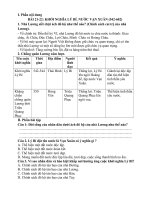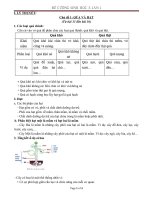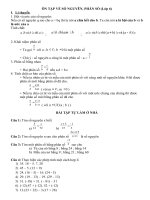đề cương ôn tập các môn khối 12 lần 2
Bạn đang xem bản rút gọn của tài liệu. Xem và tải ngay bản đầy đủ của tài liệu tại đây (108.16 KB, 5 trang )
<span class='text_page_counter'>(1)</span><div class='page_container' data-page=1>
<b>TRƯỜNG THPT GÀNH HÀO</b> <b> ĐỀ ÔN NĂM HỌC 2019-2020</b>
<b> MÔN: TIẾNG ANH 12</b>
<i><b>Mark the letter A, B, C, or D on your answer sheet to indicate the word whose underlined part</b></i>
<i><b>differs from the other three in pronunciation in each of the following questions. </b></i>
<b>Question 1: A. failed</b> B. reached C. absorbed D. solved
<b>Question 2: A. helps</b> B. laughs C. cooks D. finds
<i><b>Mark the letter A, B, C or D on your answer sheet to to indicate the word that differs from the</b></i>
<i><b>other three in the position of primary stress in each of the following question.</b></i>
<b>Question 3: A. respect </b> <b> B. marry </b> <b> C. depend </b> <b> D. predict </b>
<b>Question 4: A. understand</b> B. television C. improvement <b> D. introduce</b>
<i><b>Mark the letter A, B, C, or D on your answer sheet to indicate the underlined part that needs</b></i>
<i><b>correction in each of the following questions.</b></i>
<b>Question 5: Three hours is a long time to way.</b>
A B C D
<b>Question 6: John is going to London to visit his relatives and enjoying food.</b>
A B C D
<b>Question 7: The bomb took off with a loud bang which could be heard all over the town. </b>
A B C D
<i><b>Mark the letter A, B, C or D on your answer sheet to indicate the correct answer to each of the</b></i>
<i><b>following questions.</b></i>
<b>Question 8: Drinking too much alcohol is said to </b> harm to our health.
<b>A. make B. do C. lead</b> <b>D. take</b>
<b>Question 9: The raw sewage needs to be _______ treated. </b>
A. chemically B. chemical C. chemist C. chemistry
<b>Question 10: The Vietnamese were very satisfied with excellent performances of the young and </b>
______athletes.
A. energize B. energy C. energetically D. energetic
<b>Question 11: school fees may discourage many students from attending university.</b>
<b>A. Gaining B. Receiving C. Improving</b> D. Raising
<b>Question 12: At the end of the training course, each participant was presented with a ____ </b>
of completion.
<b>A. degree B. certificate C. diploma D. qualification </b>
<b>Question 13: </b>The high levels of pollution in the coastal areas are a
matter of great concern to the government.
<b>A. redundantly B. intensively C. marginally</b> <b>D. excessively</b>
<b>Question 14 : Mark hopes _______ a small part in the school play. </b>
<b>A. to get </b> <b> B. getting </b> <b> C. get </b> <b> D. got </b>
<b>Question 15: Many twelfth graders find it hard to _______ what university to apply to. </b>
<b>A. decide </b> <b> B. decision </b> <b> C. decisive </b> <b> D. decisively </b>
<b>Question 16: . If I _____, I would express my feelings.</b>
A. were asked B. would ask C. had been asked D. asked
<b>Question 17: The view is great, _______? </b>
</div>
<span class='text_page_counter'>(2)</span><div class='page_container' data-page=2>
<b>Question 18: He will finish this work before you _______ here tomorrow.</b>
A. leave B. will leave C. are going to leave D. would leave
<b>Question 19: I have never played badminton before. This is the first time I _______ to play.</b>
A. try B. tried C. have tried D. am trying
<b>Question 20: At the station, we often see the sigh “_______ for pickpockets”.</b>
A. watch out B. watch on C. watch up D. watch at
<b>Question 21: </b>She is the only in the discussion ____ to using nuclear power.
A. objects B. objected C. to object D. whom objects
<i><b>Mark the letter A, B, C or D on your answer sheet to indicate the word(s)CLOSEST in meaning</b></i>
<i><b>to the underlined word(s) in each of the following questions.</b></i>
<b>Question 22: Many schools provide environmental education to increase student’s awareness of</b>
conservation needs.
A. knowledge B. laws C. results D. efforts
<b>Question 23: Government have passed laws to protect wildlife from commercial trade.</b>
A. enforced B. ensured C. enabled D. enacted
<i><b>Mark the letter A, B, C, or D on your answer sheet to indicate the word(s) OPPOSITE in</b></i>
<i><b>meaning to the underlined word(s) in each of the following questions.</b></i>
<b>Question 24: Many plants and endangered species are now endangering of extinction. </b>
A. survival B. existence C. elimination D. destruction
<b>Question 25: They have not made any effort to integrate with the local community.</b>
A. cooperate B. put together C. separate D. connect
<i><b>Mark the letter A, B, C, or D on your answer sheet to indicate the most suitable response to</b></i>
<i><b>complete each of the following exchanges.</b></i>
<b>Question 26: John: “ Sorry. It’s my fault. I misunderstood the instruction”</b>
Sam: “...” Everything will be all right”
A.Go ahead! B. Keep it a secret! C. Why not? D. Not too worried
<b>Question 27: " Thank you for a lovely evening." - " ________ ."</b>
A. Yes, I`d like that B. Yes, that is nice. C. Don't mention it D. I'm glad you like it
<i><b>Mark the letter A, B, C, or D on your answer sheet to indicate the sentence that best</b></i>
<i><b>combines each pair of sentences in the following questions.</b></i>
<b>Question 28: I’ll finish this job and then I’ll phone you back.</b>
A. I’ll phone you back as soon I’ll finish this job.
B. I’ll phone you back as soon I finished this job.
C. I’ll phone you back as soon as I finish this job.
D. I’ll phone you back as soon I’m finished this job.
<b>Question 29: You mustn’t bring books into the exam room.</b>
A. Books can be brought into the exam room.
B. Books mustn’t be brought into the exam room.
C. Bring books into the exam room can be allowed.
D. Books aren’t brought into the exam room.
<i><b>Mark the letter A, B, C, or D on your answer sheet to indicate the sentence that is closet in</b></i>
<i><b>meaning to each of the following questions.</b></i>
<b>Question 30: The engine of the car needs cleaning once a month.</b>
A. The engine of the car needs to clean once a month.
</div>
<span class='text_page_counter'>(3)</span><div class='page_container' data-page=3>
<b>Question 31: The woman broke down when the police told her that her son had died.</b>
<b>A.</b> The woman turned down when the police told her that her son had died.
<b>B.</b> When the police told the woman that her son had died, she put off.
<b>C.</b> The woman got upset when the police told her that her son had died.
<b>D.</b> When the police told the woman that her son had died, she turned away.
<b>Question 32: We cut down many forests. The Earth becomes hot.</b>
A. The more forests we cut down, the hotter the Earth becomes.
B. The more we cut down forests, the hotter the Earth becomes.
C. The more forests we cut down, the Earth becomes hotter.
D. The more we cut down forests, the Earth becomes hotter.
<i><b>Read the following passage and choose the best option A, B, C or D to be used for each of the</b></i>
<i><b>blanks to complete the following passage from 33 to 37. </b></i>
Many parents are worried about the bad effects of television, especially those on their
children. Firstly, there are a lot of violent films which may lead (33)______ crimes. Secondly,
advertising is not always good (34)______ children. They see so many advertisements for sweets,
ice creams, and toys; and these advertisements make them (35)______ to go and buy unnecessary
things at once. Thirdly, sitting in front of a television set for a long time is bad for their eyes. About
one third of children wear glasses. (36)______, watching television is not creative. It is very
important for children to do something creative and athletic, (37)______ playing some musical
instrument, painting pictures, or playing football.
<b>Question 33: A. for </b> <b>B. on </b> <b>C. to </b> <b>D. in </b>
<b>Question 34: A. of </b> <b>B. at </b> <b>C. for </b> <b>D. about </b>
<b>Question 35: A. wanted </b> <b>B. wanting </b> <b>C. to want </b> <b>D. want </b>
<b>Question 36: A. Finally </b> <b>B. Nevertheless </b> <b>C. However </b> <b>D. Whatever </b>
<b>Question 37: A. so as </b> <b>B. such that </b> <b>C. such as </b> <b>D. so as to </b>
<i><b>Read the following passage and then choose the best answer for each question by circling the</b></i>
<i><b>corresponding letter A, B, C or D from 38 to 42.</b></i>
<i><b>Read the following passage and mark the letter A, B, C, or D on your answer sheet to indicate </b></i>
<i><b>the correct answer to each of the questions from 30 to 34.</b></i>
Parents complain that it is difficult to live with teenagers. Then again, teenagers say exactly the
same thing about their parents! According to a recent survey, the most common arguments between
parents and teenagers are those regarding untidiness and household chores. On the one hand,
parents go mad over untidy rooms, clothes dropped on the floor and their children's refusal to help
with the housework. On the other hand, teenagers lose their patience continually when parents tell
them off for dropping the towel in the bathroom, not cleaning up their room or refusing to do the
shopping at the supermarket.
The survey, conducted by St George University, showed that different parents have different
approaches to these problems. However, some approaches are much more successful than others.
For example, those parents who yell at their teens for their untidiness, but later clear up after them,
have fewer chances of changing their teens' behaviour. On the contrary, those who let teenagers
experience the consequences of their actions are more successful. For instance, when teenagers who
don't help their parents with the shopping don't find their favourite food in the fridge, they are
forced to reconsider their actions.
</div>
<span class='text_page_counter'>(4)</span><div class='page_container' data-page=4>
their room is their own private space. Communication is a two-way process. It is only by listening
to and understanding each other that problems between parents and teens can be solved.
<b>Question 38: Which best serves as the title for the passage? </b>
<b>A. Teen Issues </b> <b>B. Family Rules </b> <b>C. Parents' Advice </b> <b>D. Parents' Anger </b>
<b>Question 39: The phrase "go mad” in paragraph 1 is closest in meaning to _______. </b>
<b>A. get bored </b> <b>B. feel sad </b> <b>C. remain calm </b> <b>D. become angry </b>
<b>Question 40: Which is NOT mentioned in paragraph 1 as a cause of arguments between teenagers </b>
and parents?
<b>A. Teenagers drop their clothes on the floor. </b> <b>B. Teenagers go shopping a lot. </b>
<b>C. Teenagers refuse to do the housework. </b> <b>D. Teenagers do not tidy their rooms. </b>
<b>Question 41: According to paragraph 2, parents have a better chance of changing their children's </b>
behaviour by _______.
<b>A. shouting at them whenever they do something wrong </b>
<b>B. cooking them their favourite food </b>
<b>C. doing the household chores for them </b>
<b>D. letting them experience the bad results of their actions </b>
<b>Question 42: The word "they” in paragraph 3 refers to________. </b>
<b>A. parents </b> <b>B. teens </b> <b>C. psychologists </b> <b>D. children </b>
<i><b>Read the following passage and mark the letter A, B, C, or D on your answer sheet to indicate </b></i>
<i><b>the correct answer to each of the questions from 43 to 50.</b></i>
Oxford University has released a sample of interview questions – including what a rock looks
like and how you listen to music - to help students who want to study at the top institution. Among
the list of questions are: “What can historians not find out about the past?”, “Is religion of value
whether or not there is a God?” and “How can we estimate the mass of the atmosphere?”.
Prospective earth sciences students could be asked what a rock handed to them looks like,
meanwhile chemistry candidates are asked to calculate how many different molecules can be made
from six carbon atoms and 12 hydrogen atoms.
In efforts to make the interview process more transparent, the prestigious university has released
advice on how to answer the example questions just days after the deadline for applications closed.
Dr Samina Khan, director of admissions and outreach, said: “Interviews will be an entirely new
experience for most students, and we know many prospective applicants are already worried about
being in an unfamiliar place and being questioned by people they have not met.”
She added: “We want to underscore that every question asked by our tutors has a purpose, and
that purpose is to assess how students think about their subject and respond to new information or
unfamiliar ideas. No matter what kind of educational background or opportunities you have had, the
interview should be an opportunity to present your interest and ability in your chosen subject, since
they are not just about reciting what you already know."
Laura Tunbridge, from St Catherine's College, explained why a music candidate might be asked
to explain the different ways they listen to music. “The question allows students to use their own
musical experiences as a starting point for a broader and more abstract discussion about the
different ways people consume music, the relationship between music and technology, and how
music can define us socially,” she said.
Candidates who successfully clear the first hurdle with their written application will be invited
to interview. “We know there are still misunderstandings about the Oxford interview, so we put as
much information as possible out there to allow students to see the reality of the process," added Dr
Khan.
<b>Question 43: Which of the following best serves as the title for the article? </b>
<b>A. Oxford University: Lowering Standards in Times of Change! </b>
<b>B. The History of Oxford's Interviewing Schemes </b>
<b>C. Oxford University Interview Questions: Would You Pass the Test? </b>
<b>D. The Oxford's Guide to Success in Job Interviews </b>
</div>
<span class='text_page_counter'>(5)</span><div class='page_container' data-page=5>
<b>A. prospective earth sciences students </b> <b>B. historians </b>
<b>C. chemistry candidates </b> <b>D. questions </b>
<b>Question 45: Why has Oxford University publicised its sample interview questions and related </b>
advice?
<b>A. To prepare students for unfamiliar questions in their job interviews</b>
<b>B. To familiarise potential applicants with their interview process </b>
<b>C. To test public reaction to their novel interview process</b>
<b>D. To reduce confusion among most of their current students </b>
<b>Question 46: The word “reciting” in paragraph 3 most probably means __________. </b>
<b>A. repeating </b> <b>B. reassessing </b> <b>C. releasing </b> <b>D. revising </b>
<b>Question 47: According to Laura Tunbridge, the question about a candidate's ways of listening to </b>
music is intended to ______.
<b>A. judge the candidate's ability to react to familiar situations </b>
<b>B. set the context for a more abstract discussion on music-related topics </b>
<b>C. encourage the candidate to elaborate on their individual preferences </b>
<b>D. measure their understanding of how technology affects entertainment choices </b>
<b>Question 48: The word “clear” in paragraph 5 is closest in meaning to ______. </b>
<b>A. pass </b> <b>B. face </b> <b>C. give </b> <b>D. skip </b>
<b>Question 49: Which of the following is TRUE, according to the passage? </b>
<b>A. Dr Khan advises candidates to focus more on showing their general knowledge at the </b>
interview.
<b>B. Oxford University plans to use the same set of questions for all candidates. </b>
<b>C. Oxford University only releases sample interview questions for earth sciences and music. </b>
<b>D. Dr Khan understands how the notion of attending the Oxford interview may affect </b>
prospective candidates.
<b>Question 50: Which question is a history candidate LEAST likely to be asked in the Oxford </b>
interview?
<b>A. “How can one define a revolution?” </b>
</div>
<!--links-->









